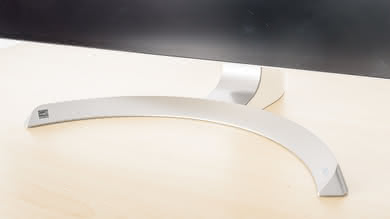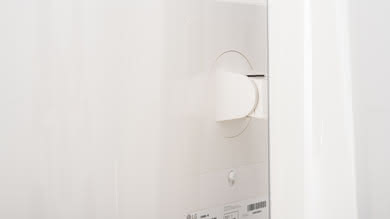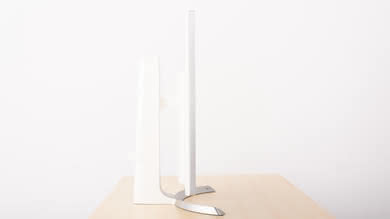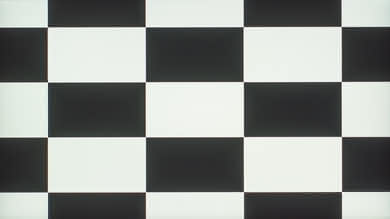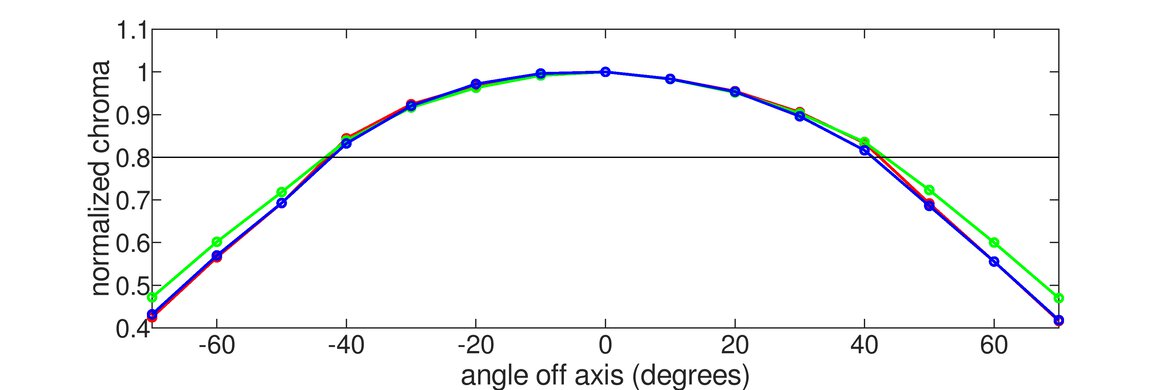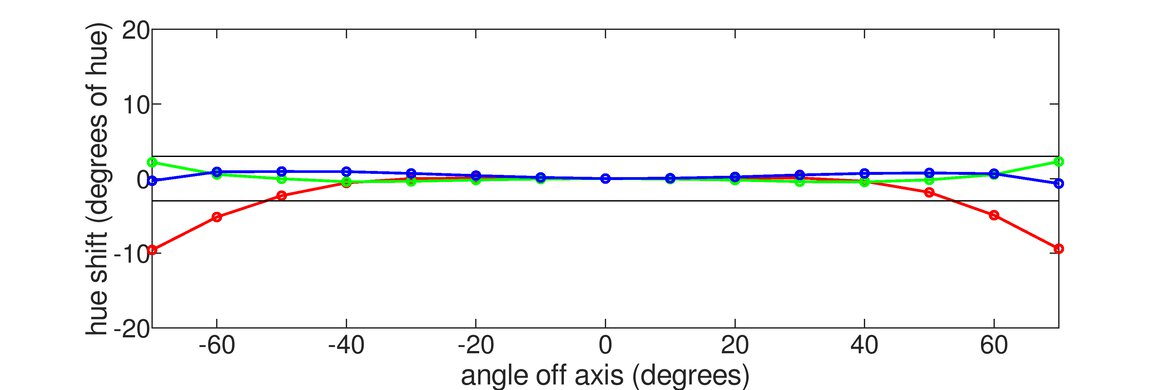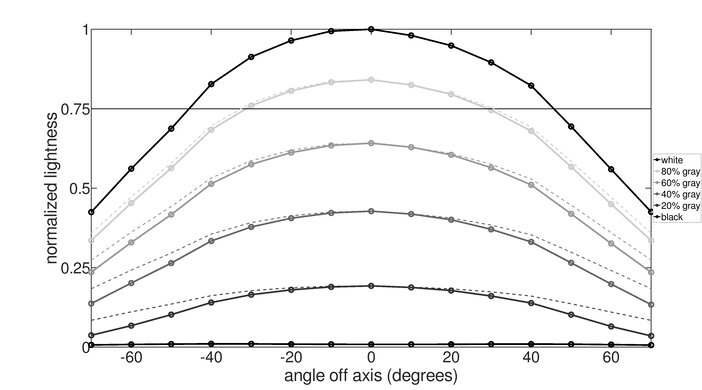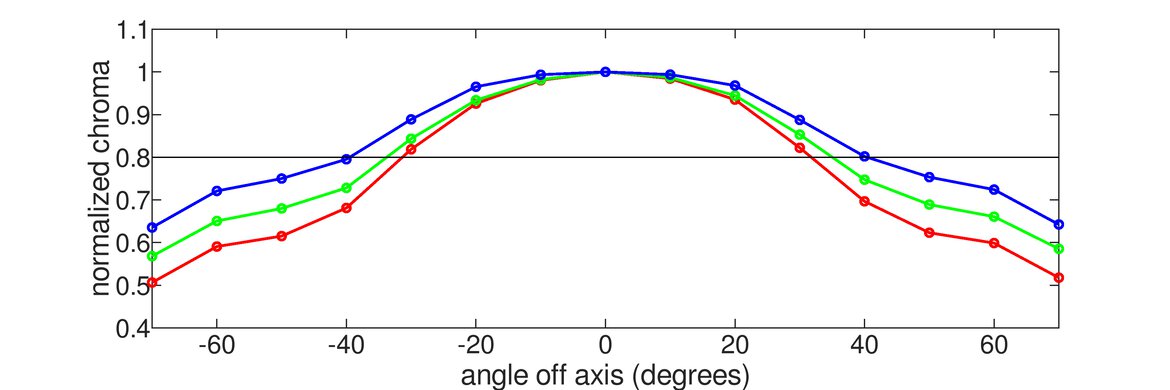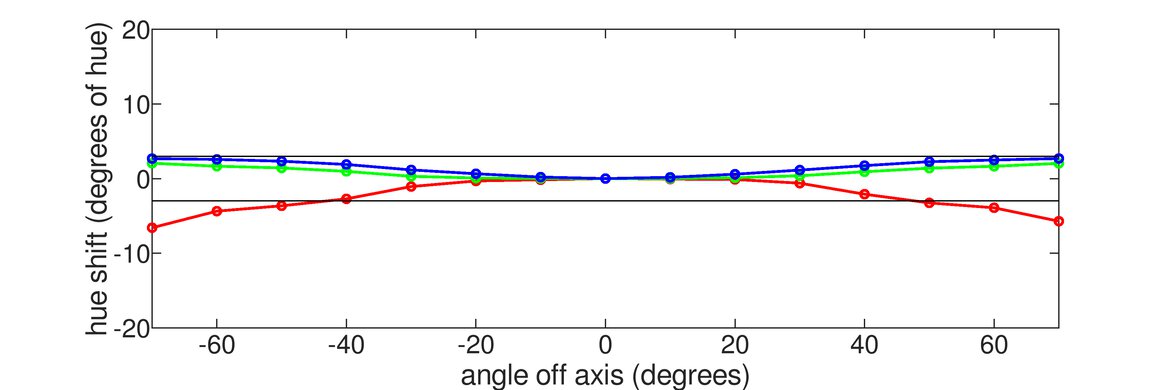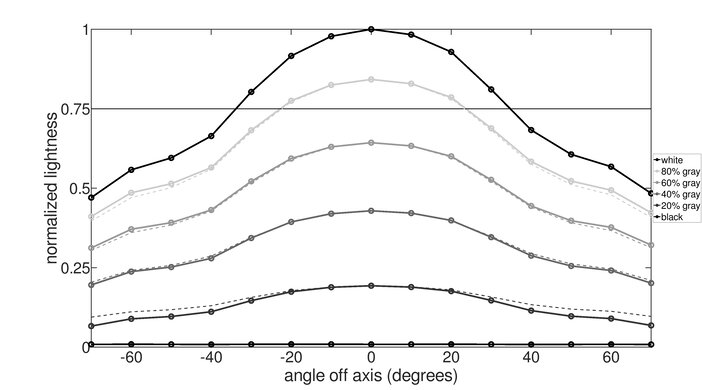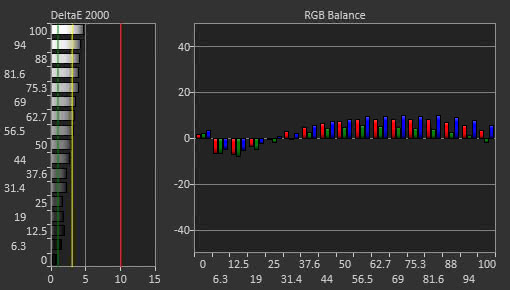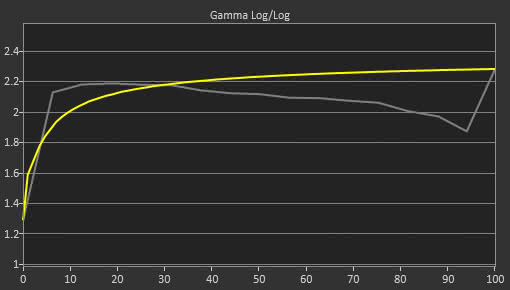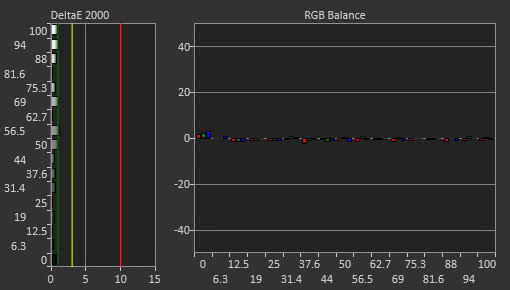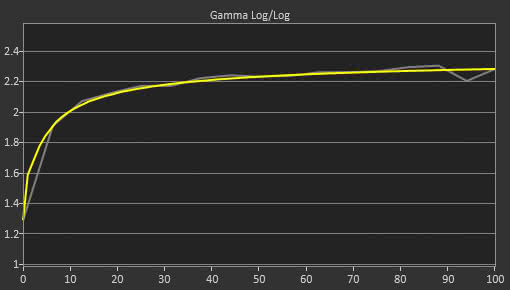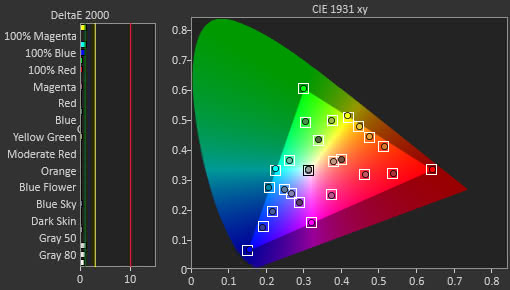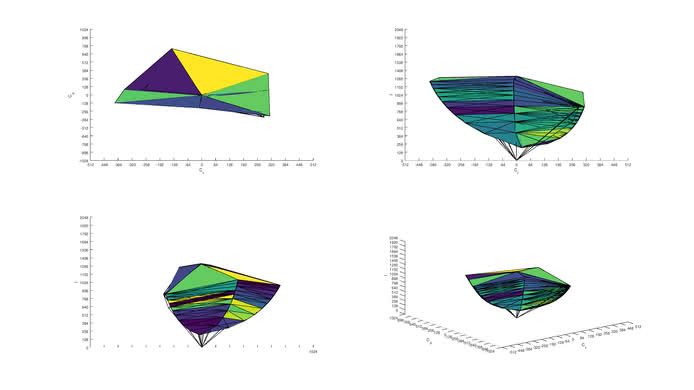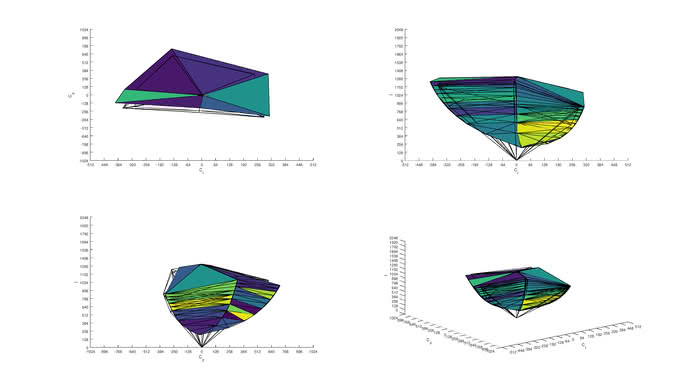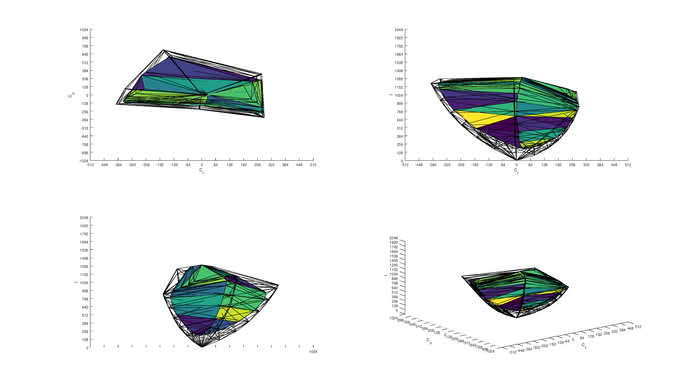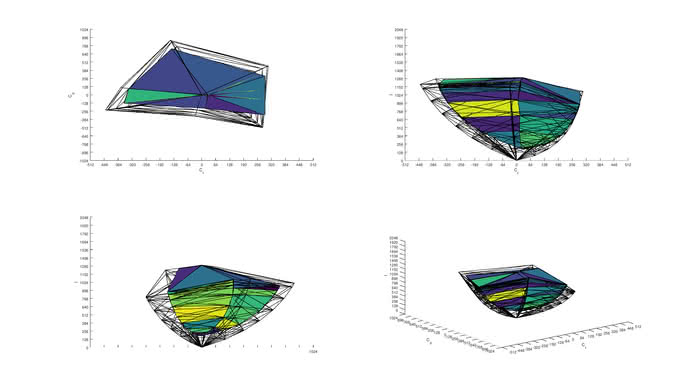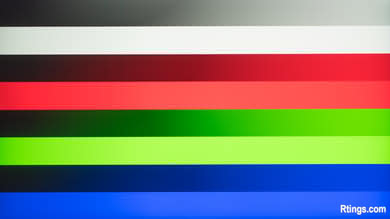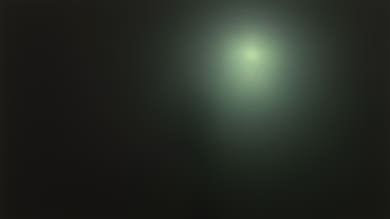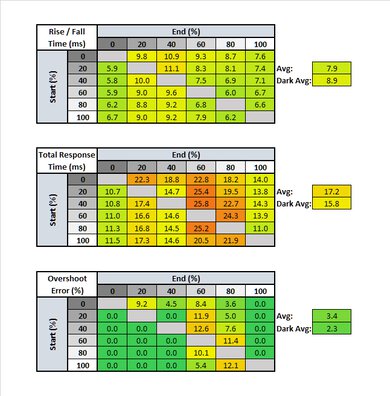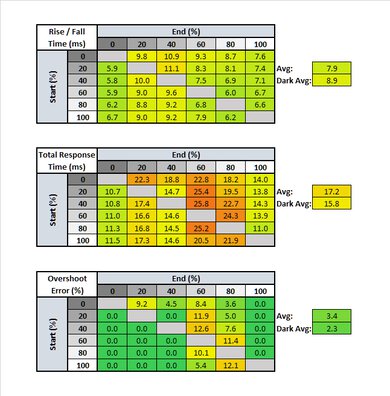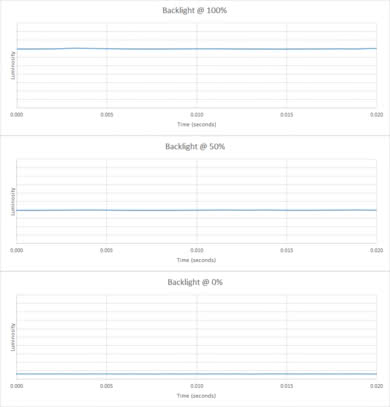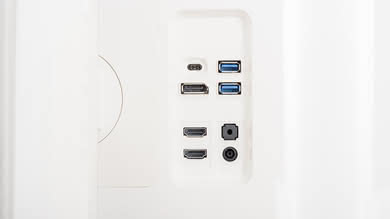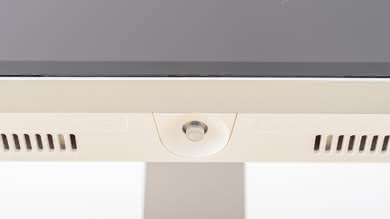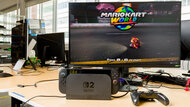The LG 32UD99-W is a good IPS monitor with a great 4k resolution, wide viewing angles, and an excellent low input lag. It supports FreeSync variable refresh rate technology but has very few additional gaming features, and some gamers will be disappointed by the limited 60Hz refresh rate. It supports HDR and displays a wide color gamut, but it's limited by the mediocre HDR peak brightness as it fails to bring out highlights.
Our Verdict
The LG 32UD99-W is a good monitor for most uses. It's a great office monitor thanks to its 32 inch, 4k screen, which is great for multitasking, and it has a sleek and modern style. Fast motion looks crisp thanks to the good response time, and it has an excellent low input lag. Unfortunately, some gamers will be disappointed by the 60Hz refresh rate. However, it has wide viewing angles, good for sharing your screen with others.
-
Image remains accurate at an angle.
-
Excellent low input lag.
-
Displays a wide color gamut.
-
Doesn't handle reflections well.
-
60Hz refresh rate is limiting for gaming.
The LG 32UD99-W is a great monitor for use in an office. It has a decent stand that has height and tilt adjustments, but can't swivel. The large, 32 inch screen and 4k resolution are perfect for multitasking and it has wide viewing angles if you need to share your screen. It can get bright enough to combat glare in most office environments, although its reflection handling is disappointing.
Good for gaming. Although it's not designed to be a gaming monitor, the 32UD99-W offers an immersive gaming experience with its large size and 4k resolution. The 60Hz refresh rate might be too limiting for some serious gamers, but it has an incredibly low input lag and good response time.
The 32UD99-W is a very good monitor for multimedia. Fast motion looks good thanks to the good response time, and the high resolution is great for watching your favorite videos online. Unfortunately, it isn't the best monitor for dark room viewing due to the low contrast ratio and mediocre black uniformity. However, it has wide viewing angles if you want to watch videos with a friend.
The 32UD99-W is great for media creation. The 32 inch screen offers plenty of space to work on and the 4k resolution delivers a crisp image. Unfortunately, it doesn't handle reflections well in bright rooms, and it doesn't get bright enough to bring out highlights in HDR. However, it has an impressive gray uniformity, so solid colors on the screen will look good.
The 32UD99-W is decent for HDR gaming. It displays a wide color gamut, but can't get bright enough to make highlights pop in HDR. The 60Hz refresh rate might be too low for some gamers, but it has a low input lag and a good refresh rate.
- 7.8 Mixed Usage
- 8.0 Office
- 7.7 Gaming
- 7.8 Multimedia
- 8.1 Media Creation
- 6.9 HDR Gaming
Changelog
- Updated Feb 17, 2020: Converted to Test Bench 1.1.
- Updated Jan 22, 2019: The 32UD99 was incorrectly listed as having two DisplayPort Connections, there is only one.
- Updated Jan 17, 2019: The Wide color gamut result was incorrect. The 32UD99 does have a wide color gamut.
- Updated Jan 17, 2019: We tested the monitor's compatibility with NVIDIA's new FreeSync driver. See our full investigation into NVIDIA's FreeSync Drivers here.
- Updated Sep 19, 2018: Review published.
Check Price
Differences Between Sizes And Variants
We tested the 32 inch LG 32UD99-W, which is the only model available. There are other 4k monitors available from LG, some of which are listed below. Note that these are different models with different capabilities.
| Model | Size | Native Resolution | Refresh rate | Notes |
|---|---|---|---|---|
| 32UD99-W | 32" | 4k | 60Hz | FreeSync, HDR |
| 32UD59-B | 32" | 4k | 60Hz | FreeSync |
| 27UD68P-B | 27" | 4k | 60Hz | FreeSync |
Our unit was manufactured in July 2018 and you can see the label here.
Compared To Other Monitors

The LG 32UD99-W is a great monitor with low input lag and wide viewing angles, and one of the best 4k monitors we've tested so far, but the added expense for the limited HDR support might not be worth it. See our recommendations for the best gaming monitors, the best monitors for MacBook Pro, and the best 32-inch monitors.
The LG 32UD99-W is slightly better than the LG 32UL950. Both offer very similar performance, but the 32UD99-W has a flicker-free backlight, which is great, and it has a slightly higher native contrast ratio. The 32UD99-W has a slightly better stand that is made of metal, and better build quality.
The LG 32UD99-W is much better than the LG 32UD59-B. The two monitors have a similar design, with a nearly identical frame and bezel, just a different color. The main difference between the two is due to the different panels; the UD59 uses a VA panel whereas the UD99 uses an IPS. The UD99 is brighter, has wider viewing angles, and supports HDR.
The LG 32UD99-W is somewhat better than the Dell U3219Q. The LG 32UD99-W is flicker-free and has better black uniformity, which is great for dark scenes. Also, the LG 32UD99-W supports FreeSync, which is great if you're a gamer. The Dell U3219Q, on the other hand, has much better ergonomics that allow you to place it comfortably with ease.
The LG 32UD99-W has very similar performance to the LG 27UK650-W. The LG 32UD99-W has a larger 32" screen that some people might find more comfortable to work on. The 32UD99-W also has a built-in USB hub and a USB-C port that supports power delivery and DisplayPort Alt Mode.
The LG 32UD99-W is better than the ASUS ROG PG348Q for most uses. The LG is brighter, has better gradient handling, and supports HDR. The 32UD99 also has a better dark room performance, with much better black uniformity. The PG348Q and 32UD99-W have similar overall gaming performance, but the ASUS can be overclocked to a 100Hz refresh rate when connected with DisplayPort, and it supports NVIDIA G-SYNC instead of FreeSync.
The LG 32UD99-W is a bit better than the Samsung CHG70, depending on your use. The Dell is better suited for office use thanks to the wider viewing angles and larger, higher resolution screen. The Samsung is better suited for gaming. It has better motion handling, mainly due to the faster 144Hz refresh rate, and it has an optional black frame insertion feature to further clear up motion. The Samsung CHG70 also has better HDR support, with a wide color gamut and much better color volume.
The LG 32UD99-W is slightly better than the Dell U2718Q. The LG has better HDR support, with a better color gamut and much better HDR color volume. The LG handles motion better, with a flicker-free backlight as well as FreeSync VRR support. The Dell, on the other hand, has a better stand that can easily be adjusted to an optimal viewing position.
The LG 32UD99-W is much better than the LG 32GK850G-B. The LG 32UD99 has better viewing angles due to its IPS panel and supports HDR and 4k resolution. On the other hand, the LG 32GK850G-B has a higher native contrast ratio that makes blacks look deep in a dark room. The 32G850G-B is also a better monitor for gaming since it has a faster pixel response time that only leaves a small blur trail, a faster refresh rate, and a lower input lag.
The LG 32UD99-W is much better than the BenQ EW3270U for most people, unless the deeper blacks of the BenQ due to the VA panel are of great importance. The LG 32UD99 has an IPS panel with significantly wider viewing angles, so you can share your work with your colleagues more easily. At the same time, the much better ergonomics allow you to position the monitor to your liking with ease.
The LG 32UD99-W is significantly better than the Samsung C34J791/CJ791 for most people in the majority of uses. The LG has better viewing angles, due to the IPS panel, better ergonomics, can get brighter, supports HDR, and has a 4k resolution. The Samsung CJ791 has a VA panel and slightly better blacks. It also has a faster refresh rate, a lower input lag, and a curve profile for those who like it.
The LG 32UD99-W is much better than the Dell UltraSharp U2721DE for most people. The LG has a larger, higher-resolution screen, which is much better for multitasking, and it delivers sharper text. The LG also supports HDR and is a more versatile monitor thanks to a few dedicated gaming features. On the other hand, the Dell has much better reflection handling, making it a better choice for a bright office.
Test Results
The stand is large, and the curved shape prevents you from placing larger objects directly in front of the monitor. The monitor wobbles significantly, even typing on a nearby keyboard causes the screen to shake noticeably. It's slightly better than the LG 32UL950.
Decent ergonomics. The stand allows you to adjust the height of the monitor, and it can tilt a bit. The monitor can also be adjusted from a portrait to landscape orientation, but the stand doesn't swivel.
The back is a uniform glossy white finish. There's a small loop for cable management, but it isn't very effective at keeping a clean desk.
There's no local dimming feature. The video above is provided for reference only.
Very good SDR brightness. The LG 32UD99-W maintains consistent brightness across all scenes. This is almost the same as the LG 27UK650.
Mediocre HDR peak brightness. It doesn't get bright enough to bring out highlights and make colors pop, and it doesn't remain consistent when different types of content flash across the screen.
As is the case with most IPS panel monitors, the 32UD99-W has good horizontal viewing angles. This is good if you need to share your screen with coworkers or friends.
The 32UD99-W has alright vertical viewing angles. The screen may appear darker at the edges if you sit close to it, but this shouldn't be a problem for most people.
Impressive gray uniformity. There's almost no visible dirty screen effect in the center, which is great for browsing the web or playing sports games. The edges of the screen are a bit darker than the rest of the screen, but this shouldn't bother most people.
Update 01/07/2020: We have seen a few reports of increasing light bleed from the corners over time. Some people have seen this start even 1-2 years after receiving their unit. We haven't noticed this on ours.
Mediocre black uniformity. There's visible clouding throughout. This is most noticeable when viewed in the dark.
Okay out-of-box color accuracy. Most of the colors will be inaccurate, but the color temperature is somewhat close to the 6500K target. That gamma curve doesn't follow the target very well, so most scenes will appear brighter than intended.
Excellent accuracy after calibration. Color accuracy is nearly perfect and the gamma follows the target almost perfectly. Also, the color temperature is extremely close to the 6500K target.
You can download our ICC profile calibration here. We don't recommend using this profile, as the calibration values vary per individual unit, even for the same model, due to manufacturing tolerances.
Good HDR color gamut. Great coverage of the more common DCI P3 color gamut, but the wider Rec. 2020 coverage is only decent, but it still has a wide color gamut. The Samsung CHG70 has a wider color gamut.
| Overdrive Setting | Response Time Chart | Response Time Tables | Motion Blur Photo |
| Off | Chart | Table | Photo |
| Slow | Chart | Table | Photo |
| Normal | Chart | Table | Photo |
| Fast | Chart | Table | Photo |
Good response time. The best Overdrive setting is 'Normal'. There's a bit of overshoot in most transitions. With the 'Fast' setting, there's slightly more overshoot but not much improvement in response time.
| Overdrive Setting | Response Time Chart | Response Time Tables | Motion Blur Photo |
| Off | Chart | Table | Photo |
| Slow | Chart | Table | Photo |
| Normal | Chart | Table | Photo |
| Fast | Chart | Table | Photo |
Since the max refresh rate is 60Hz, the recommended Overdrive setting is once again 'Normal', although there's some overshoot in most transitions.
There's no black frame insertion feature to help reduce motion blur.
Alright refresh rate. The native refresh rate of 60Hz can go as low as 40Hz using FreeSync VRR technology, which can be used over DisplayPort or HDMI.
Excellent low input lag on the 32UD99-W, and it only slightly increases with VRR enabled, which is great.
The LG 32UD99-W has an excellent 4k resolution and large 32 inch screen. This is great for multitasking or for a more immersive gaming experience.
There's a USB-C port that supports DisplayPort Alt Mode, which allows you to display the image from a compatible device on the screen and at the same time charge the connected device with only one cable.
The 32UD99-W has integrated speakers, and it supports HDR10. The included LG Screen Split 2.0 software can be used to simulate multiple virtual screens on the display or to enable picture-in-picture.
There are a few additional features that are typically found on most LG monitors, including:
- Super Resolution+: An upscaling feature that tries to improve upscaling quality.
- Black Stabilizer: Improves black shades without affecting white shades.
Comments
LG 32UD99-W: Main Discussion
Let us know why you want us to review the product here, or encourage others to vote for this product.



